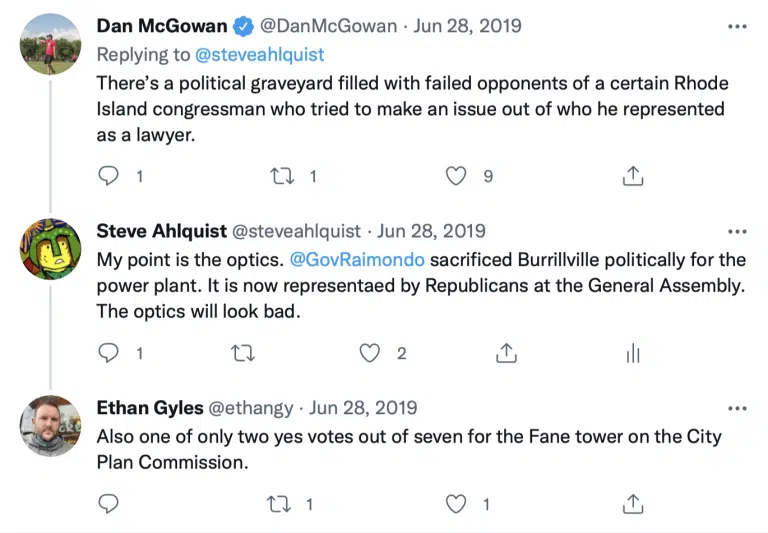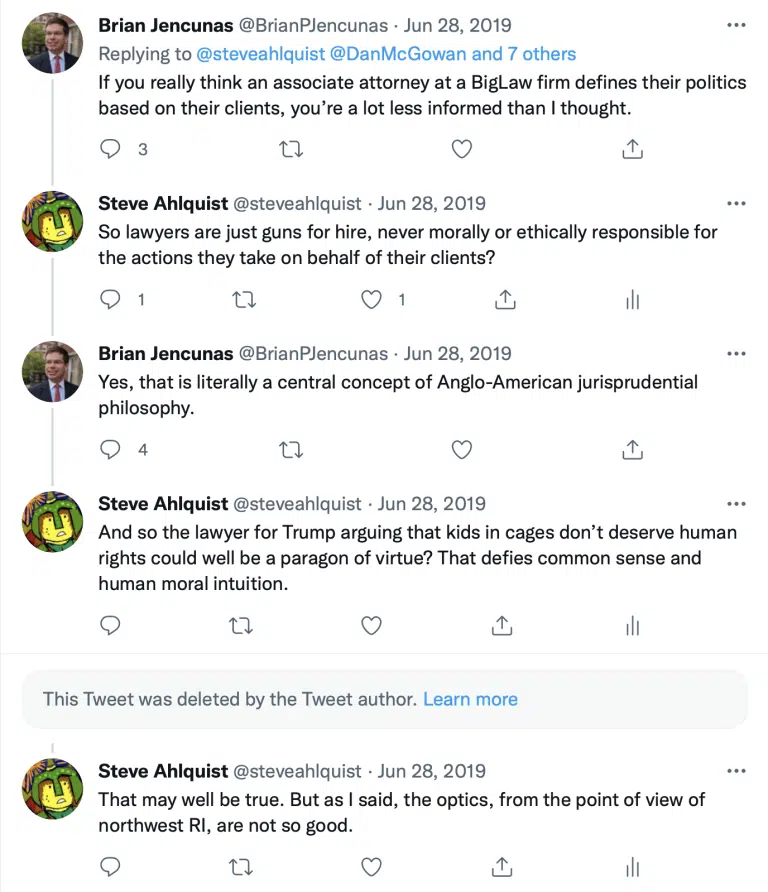How far does "everyone deserves representation go?
Are lawyers morally culpable for the terrible acts they help their clients to perform? This is a complicated question, and not debated nearly enough.
I first became
interested in this question when Boston
Globe reporter Dan
McGowan reported that Nicole
Verdi, of the law firm Adler
Pollock and Sheehan, had been hired by then Rhode Island Governor Gina Raimondo.
I noted that Verdi had
been on the legal team for Invenergy, fighting to build an $1b fracked gas and
diesel oil burning power plant in pristine forests of Burrillville. A power
plant that Governor Raimondo fought for until the end, due to the massive
campaign contributions she got from the company’s owner, Michael Polsky.
McGowan countered, in defense of Verdi, that attacks on lawyers based on the clients they represented has never been a successful political strategy. But I wasn’t making a political point. I was making a moral one.
I also received pushback from Brian Jencunas, a Boston based political consultant whose job is to literally defend the reputations of corporatist politicians. Jencunas opined that an “associate attorney at a BigLaw firm” doesn’t “define their politics based on their clients,” and insulted me to boot.
This seemed morally suspect to me. As a society, we routinely make moral judgements about the actions of people based on their actions. Why should lawyers be judged by a different standard? I asked Jencunas if lawyers are “just guns for hire, never morally or ethically responsible for the actions they take on behalf of their clients” and Jencunas replied, “Yes, that is literally a central concept of Anglo-American jurisprudential philosophy.”
Jencunas was wrong.
Abraham Lincoln, as a lawyer, is quoted as saying,
“Yes, we can doubtless gain your case for you; we can set a whole neighborhood at loggerheads; we can distress a widowed mother and her six fatherless children and thereby get you $600 to which you seem to have a legal claim, but which rightfully belongs, it appears to me, as much to the woman and her children as it does to you. You must remember that some things legally right are not morally right. We shall not take your case, but will give you a little advice for which we will charge you nothing. You seem to be a sprightly, energetic man; we would advise you to try your hand at making $600 in some other way.”
What Lincoln did was
note the difference between what is legally permissible, and what is moral.
EDITOR’S NOTE: The “right to an attorney,” under the Sixth Amendment of the Constitution, as interpreted by the Supreme Court, only applies to criminal felony cases and to some criminal misdemeanor cases. It doesn’t apply at all to civil cases.
Lawyers are not required by law to represent clients in civil cases. Usually they choose to do so (or not) because they are paid to do so, either by client fees or by taking a share of winnings when representing a client on a “contingency fee” basis.
In some instances, a client can get free representation (“pro bono”) from public interest groups, Legal Aid, or private attorneys if they fit the criteria set by the agency, law firm or lawyer.
The Supreme Court has also ruled that an attorney may not help a client to break the law, especially in the case of perjury. – Will Collette
The law is only one of at least three ways in which society is governed and an orderly society is maintained. The other two are personal ethics, and social constraints or norms.
Professor of Law and
the former dean at Hofstra Law School Monroe Freedman presciently
took up my question in 1977. He asked, “Is the lawyer just a ‘hired gun, or
must the lawyer obey his own conscience, not that of his client?” [Personal
Responsibility in a Professional System (1977); Monroe H Freedman]
Freedman’s answer was,
“Barring extraordinary circumstances… the attorney is free to exercise his or
her personal judgment as to whether to represent a particular client. Since a
moral choice is implicated in such a decision… others are entitled to judge and
to criticize, on moral grounds, a lawyer’s decision to represent a particular
client.”
The mid 70s were a
time of deep reflection on the morality of lawyers, due to Nixon’s Watergate
scandal and the number of lawyers implicated in crimes on behalf of the
president.
Philosopher Richard
Wasserstrom in 1975 wrote that there is “something quite seductive”
about “being able to turn aside so many ostensibly difficult moral dilemmas
with the reply that my job is not to judge my client’s cause, but to represent
his or her interest.” [Lawyers as Professionals: Some Moral Issues (1975);
Richard Wasserstrom]
Stephen Pepper, Professor of Law at the University of Denver
Sturm College of Law, might be the best defender of the lawyer’s “amoral,
ethical role” – the position that lawyers do not bear moral responsibility for
actions taken on behalf of their clients, and in fact, their actions are always
good (when within the law.) [The Lawyer’s Amoral Ethical Role: A Defense, A
Problem and Some Possibilities (1986); Stephen Pepper]
David Luban, a Georgetown University Professor of Law and
Philosophy, breaks Pepper’s argument down into three premises and a conclusion:
- Law is intended to be a public good which increases autonomy.
- “autonomy [is] preferred over ‘right’ or ‘good’ conduct”
- “increasing individual autonomy is morally good.”
Conclusion: “what the
lawyer does is a social good… The lawyer is a good person in that he provides
access to the law.”
Luban notes that
“helping people exercise autonomy is good” but “since doing bad things is bad,
helping people do bad things is bad. The two factors must be weighed against
each other, and this Pepper does not do.” [The Lysistratian Prerogative: A
Response to Stephen Pepper (1987); David Luban]
Luban then goes onto
say, “the law cannot proscribe all intolerable conduct, for human society would
then be crushed flat by a monstrous, incomprehensible mass of law. And scruples
– conscience, morality – will not take up all the slack…
“Instead,” writes
Luban, “we rely to a vast extent on informal social pressures to keep us in
check. Why do people break into the line at the cafeteria so seldom? Why do
they bus their own trays? Why do they keep malicious, gossiping tongues in
(relative!) check at the office? Why are they civil to subordinate employees?
Why do they keep their word? … For many people the answer is scruples,
morality; but for many people it is not. When conscience is too faint, I
submit, the answer to all these questions is that people worry about what other
people will say, think and do, and guide their behavior accordingly.”
At this point, I’d
like to differentiate between different kinds of lawyering.
- Defense lawyers checking the power of the state through a robust defense of those accused of crimes.
- Lawyers who advocate for their wealthy corporate clients as lobbyists or legal advocates.
Defense lawyers exist,
and are constitutionally mandated, to check state power and to prevent the
state from over zealous policing. Obviously, for many communities, the system
isn’t working all that well. The system is plagued by racism and classism. But
the idea is sound: Defense lawyers are needed.
Corporate lawyering,
like that done by Adler Pollock and Sheehan, are different. They can choose
their clients. They do not have to represent positions they disagree with. In
fact, it would be fair to say corporate lawyers have a moral obligation to say
“No” to clients that want them to help perform immoral but technically acts.
Ask yourself, in what
other field are professionals given a social pass when they commit immoral, but
strictly legal acts?
Last year Harvard
Law School students protested the law firm Paul Weiss for
their work on behalf of ExxonMobil.They were quickly attacked
via an editorial in
the Harvard Crimson.
As [former] State
Representative and Harvard Law School student Aaron Regunberg pointed
out in his rebuttal,
the “premise of the Crimson editorial was a regurgitation of the basic precept
that everyone deserves a lawyer.”
“It is always
interesting,” noted Regunburg, “when apologists for corporate power trot out
this principle to defend a legal system that leaves 80% of the civil legal needs
of poor Americans unmet, or to justify an educational pipeline in which just
17% of graduates from Harvard Law School go on to work for organizations
dedicated to serving the bottom 95% of the income bracket.”
The Harvard Law
Students are “choosing a livable future” by “committing to disrupt business as
usual until leaders in the legal industry drop Big Oil,” wrote Regunburg, a
direct refutation of the “lawyer as hired gun” or lawyer as “amoral ethical”
necessity.
This issue is
important in Rhode Island, long after the Invenergy plant in Burrillville has
been defeated. We have a politically connected lobbyist lawyer, Nicholas
Hemond, fighting hard to
expand fossil fuels in the Port of Providence.
Hemond threw a $1000 a
plate fundraiser for Providence Mayoral candidate and [former] Chief of Staff
for Governor Raimondo, Brett Smiley. Perhaps buying into the idea
that lawyers are not morally responsible for their actions, Smiley gladly accepted the support.
We have [former] Rhode
Island House Speaker William Murphy, being paid $30,000 a
year to make sure payday lending is never outlawed in Rhode
Island. Murphy isa mentor to [former] Rhode Island Speaker of the House Nicholas
Mattiello.
[For more on PayDay
loans, see here.]
The fact is, the
behavior of certain lawyers on behalf of their terrible clients is shameful,
and should be understood as such. These lawyers evidence no understanding of
their actions as immoral. The law being necessarily incomplete, and these
lawyers having no personal morality to guide them, it is up to society to make
these lawyers worry “about what other people will say, think and do” so these
lawyers will “guide their behavior accordingly.”
[This piece originally
appeared as a Twitter thread.]



